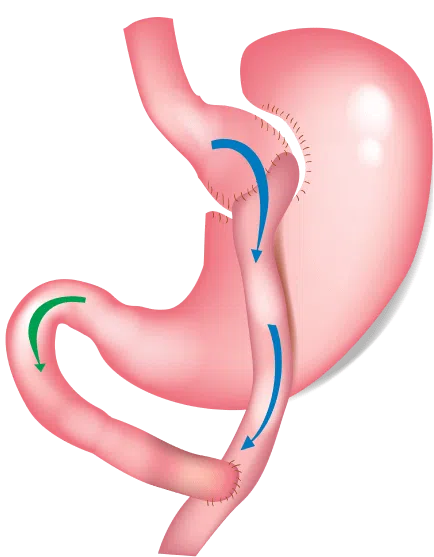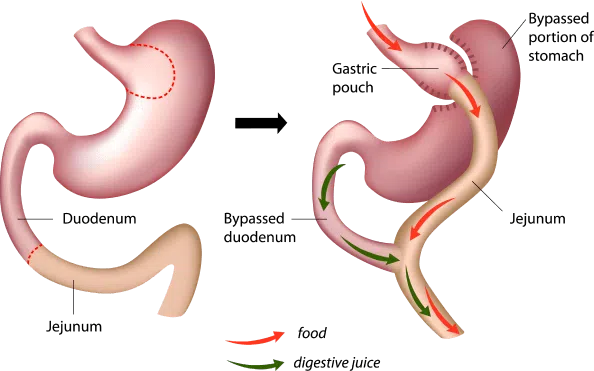Gastric Bypass Surgery
Gastric Bypass Surgery at Beverly Hills Physicians
First performed in 1994, the gastric bypass remains nearly synonymous with weight loss surgery in the popular imagination, no doubt because the surgery has been around the longest and built up an extremely solid track record of success. It is, however, significantly more invasive than more recently developed procedures such as the sleeve gastrectomy but doctors may recommend them in some circumstances.
What is a Gastric Bypass
The surgery begins by literally bypassing the stomach, creating a fist-sized pouch as a replacement. Next, the surgeon fashions a Y-shaped connection that attaches the pouch directly to the small intestine, additionally bypassing the large intestine. This is why the surgery is often referred to as a rou-en-Y by medical professionals.

Gastric Bypass Benefits
This procedure is very powerful because it works in three ways:
01
The pouch replacing the stomach makes eating larger amounts of food extremely uncomfortable. Eating too much can lead to an issue called dumping syndrome, which is as unpleasant as it sounds.
02
Channeling food directly to the small intestine and avoiding the large intestine means that significantly fewer calories can be digested by the body.
03
Perhaps most importantly, completely bypassing the stomach significantly reduces the body’s production of hunger-inducing hormones, consistently reducing the urges that make us want to overeat.

Gastric Bypass Downside
It’s easy to see why this procedure has proven to be so powerful but making such radical changes naturally has some downsides. Fewer calories are processed by the digestive tract but the same applies to nutrients – supplements are therefore especially essential following gastric bypasses. Also, there are restrictions on the foods patients can eat post-operatively. By contrast, people who get other procedures can typically eat the same kinds of food they ate before, though naturally in much smaller portions.
The preponderance of the evidence seems to indicate that gastric bypasses and sleeve gastrectomies produce similarly consistent outcomes. Given the lower rate of complications, therefore, sleeve gastrectomies are usually recommended over gastric bypasses.* There are, however, exceptions in some cases where a somewhat greater degree of certainty may be desirable.
* “Two-year outcomes of sleeve gastrectomy versus gastric bypass: first report based on Tehran obesity treatment study (TOTS),” BMC Surgery. Alireza Khalaj, Erfan Tasdighi, Farhad Hosseinpanah, Maryam Mahdavi, Majid Valizadeh, Elham Farahmand, Hamidreza Taheri & Maryam Barzin. July 20, 2020.

Bariatric Surgery Saves Lives
If you’re reading this there’s a good chance you already know about the most common health problems associated with severe obesity, including type 2 diabetes, high blood pressure, increased risk of heart attacks and strokes, chronic pain, social isolation, and, not surprisingly, depression…just reading this list can make you depressed!
Even more depressing, however, are the dismal statistics on significant and permanent weight loss without bariatric procedures. Very emphatically, this is not because obese people lack the will and fortitude to lose weight on their own. It’s that humans are simply not built to lose weight permanently. People try and usually fail but some are especially determined and hit their goal weight – only to backslide almost inevitably. “Yoyo dieting” is an all-too-common phenomenon that carries its own risks.
At this time, bariatric surgeries are the only procedures we have that have been shown to make it possible for most people to lose significant weight and keep it off.

A Deeper Dive into the Weight Loss/Obesity Conundrum
Survival was a daily struggle for most people during most of human history. As hunter-gatherers and farmers, every day involved serious physical effort simply to find or grow food by hand. Of course, now we live in a time when high-calorie snacks and meals are never further away than the nearest convenience store or fast-food restaurant.
So, when we pampered modern humans dramatically cut back on calories and begin to burn fat and lose weight, our bodies act as if the fat times have ended and famine has arrived. They start sending out hormonal signals to the brain that feel exactly like real hunger, essentially bullying us into seeking out calories that we can turn into the fat that once protected us from starvation. Our metabolism may also slow down to try and force us to store as much of that fat as possible.
It just gets worse. The more weight we lose, the more our body will relentlessly produce more and more hunger hormones and digest calories more efficiently to get us back to our former weight. The worst part is that it doesn’t get much better for most people over time.
Meanwhile, trendy new diets continue to emerge – many claiming to deal with these metabolic issues. Especially here in Southern California, we hear a great deal about high-protein, low-carbohydrate diets. It’s important to note, however, that the most enthusiastic boosters of these diets are usually appearance-conscious people who have never been remotely obese. Too many of them have no idea why, say, if they can put in a little extra effort to lose 5, 10, or 15 pounds, why you can’t as easily lose 50, 70, or over 100!
Here at Beverly Hills Physicians, we understand the very serious challenges faced by severely obese people, and our compassionate, experienced, and knowledgeable team is here to provide you with all of the support you need to make a fully informed decision and perhaps make a major change in your life with the right kind of bariatric procedure.
Is Weight Loss Surgery for You?
It may be if you meet you meet the following conditions:
- You fit the medical definition of severe obesity (see the next section);
- ·You’ve tried and failed to lose weight on your own;
- You’re ready to make a serious change to your life that will permanently alter your relationship with food.

Gastric Bypass Surgery Cost
Because of their proven medical benefits, most insurance companies now cover gastric bypasses and other weight loss procedures. The primary condition is that patients must have a BMI of 40 or over or 35 and over while suffering from related health problems including type 2 diabetes and high blood pressure.
While gastric bypass surgery cost is therefore affordable for many patients, even patients with minimal or no health coverage may consider the long-term benefits of the procedure as well as the inevitable healthcare costs associated with obesity. If patients have financial concerns, Beverly Hills Physicians’ consultants are also able to work with patients to set up payment plans. For more information see our finance and insurance page.

More About Weight Loss Surgery with Beverly Hills Physicians
Beverly Hills Physicians offers the full range of weight loss procedures performed by some of the finest bariatric surgeons available. Whether you select gastric bypass surgery or another procedure, choosing to have bariatric surgery is always a major decision, and there’s no getting around the fact that the medical provider you choose can make a big difference in your success.
That’s why so many people are choosing Beverly Hills Physicians for their gastric bypass procedure. Of all the places to get bariatric surgery in the Greater Los Angeles area, Beverly Hills Physicians has developed a reputation for outstanding health care delivered with a sensitive touch. For details, call us or reach out electronically for a free initial consultation.
Promotionof the Month
Your choice of a Beverly Hills Physicians makes a big difference
Your choice of a Beverly Hills Physicians makes a big difference. Our fat transfer to buttocks procedure is provided by outstanding, board certified plastic surgeons and a support staff to help you through the entire process. The best way to get started is to request a free consultation at one of our offices. We look forward to hearing from you.

